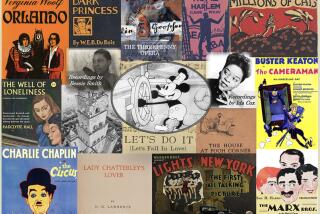Setting DVD Upstart on âPauseâ
Having made two fortunes developing high-tech products for businesses, Michael Malcolm decided to try his hand at entertainment gear for the home.
His companyâs digitally powered products have won plaudits from reviewers for making it easier to manage and enjoy DVDs. But they also attracted a lawsuit from the group that dictates how DVDs must be protected against piracy, demonstrating how tricky it can be for entrepreneurs to transform entertainment using the digital tools that remade other industries.
Kaleidescape Inc.âs products allow people to copy their DVDs onto a âhome serverâ -- a set of hard disk drives connected to a home network. The system lets users store all their movies in a single place yet watch them on any screen in the house.
At $27,000, the basic setup costs more than a new Honda minivan, in part because of the productsâ elaborate anti-piracy features.
Said co-founder and Chairman Malcolm: âWeâve taken every step we could think of to prevent people from making an infringing use of this system.â
Nevertheless, Mountain View, Calif.-based Kaleidescape ran afoul of the DVD Copy Control Assn., the group that controls the anti-piracy technology on Hollywood DVDs. In a lawsuit filed in Santa Clara County Superior Court in December, the association accused Kaleidescape of violating its agreement with the group by, among other things, letting people make permanent copies of their movies.
âThe license has provisions we have to enforce,â said Bill Coates, an attorney for the DVD association. âWe donât want to sue anybody, but Kaleidescape was unmoving.â
The limits on copying were designed to stop people from amassing digital libraries from the DVDs they rent or borrow from friends. Kaleidescape executives say they not only comply with the agreement but also take extra steps to deter people from copying discs they do not own.
The entertainment industry has a history of incorporating and profiting from new technologies, but it has fiercely resisted some breakthroughs that have threatened to undercut sales. For example, the major studios and record companies have asked the Supreme Court to hold two file-sharing companies liable for their usersâ piracy, a move that numerous high-tech companies said would hamper innovation.
This time, though, itâs not just Hollywood that is trying to stop an upstart. The DVD association is a coalition of movie studios, consumer electronics manufacturers and technology companies whose actions reflect the wishes of all three segments.
Kaleidescapeâs critics say the company could have developed a similar system that stored DVDs in a multi-disc changer instead of copying them onto a hard drive. Doing that would have kept the company out of the courthouse.
Defenders say there are some things a digital movie jukebox can do that a mechanical one cannot, such as letting users watch different parts of the same movie in different rooms of the house.
Many tech-savvy movie fans are already using illegal but widely available software to âripâ DVDs onto computers, creating digital film libraries that can be shared over the Internet as well as in the home.
Kaleidescapeâs system, by contrast, stores and transports the movies in an encrypted format that canât be shared online, Malcolm said.
âArguably, what Kaleidescape did was the right thing,â said one Silicon Valley executive, who asked not to be identified. âThey came up with a system that attempted to honor what it meant from a legal perspective to let people rip a DVD.
âIf you want to do DVD ripping today, itâs really easy,â he added. âBuy a cheap PC, download some illegal ripping software, and soon youâre watching movies in any room in your house. You just donât tell anyone that thatâs what youâre doing.â
Several Hollywood executives said they wanted to provide a legitimate way to fill a digital movie jukebox without enabling people to rent, rip and return. One approach being studied would use special codes on the DVD or in the packaging to prevent a disc from being ripped more than once, said Mitch Singer, an executive vice president at Sony Corp.âs Sony Pictures Entertainment.
Other consumer electronic companies are interested in making digital movie jukeboxes too, hoping to tap the same enthusiasm that has led music lovers to rip their CD collections onto their computers.
But âright now, legally, you really canât do that with DVDs,â said Paul Meyhoefer, director of display products for Pioneer Electronics (USA), the Long Beach-based subsidiary of Pioneer Corp. of Japan. âThatâs a huge question and an issue we deal with every day in our planning.â
Kaleidescapeâs founders -- Malcolm, his stepson Dan Collens and Cheena Srinivasan -- are all engineers skilled in the development of high-performance digital storage devices. Malcolm launched Network Appliance Inc. of Sunnyvale, Calif., which became the leading supplier of hard-drive-based storage systems for corporate networks. Then he launched CacheFlow Inc., also of Sunnyvale, which developed storage appliances for Internet service providers to help customers download Web pages faster.
Malcolm left CacheFlow in 2000, before the Internet bubble burst and the companyâs highflying shares plummeted. He and his former Network Appliance colleague Srinivasan then started talking with Collens, who had worked with Malcolm at CacheFlow, about the next opportunity.
âWe actually looked at a fair range of possible markets to go after and decided that what would be challenging and interesting to us would be to try to solve the problem of delivering entertainment-quality video to the home via the Internet,â Malcolm said.
Rather than stream movies to a PC, the trio wanted to enable users to download them to an easy-to-use, high-capacity storage device that would be linked to TVs. Such a âhome media serverâ did not exist, so the group, which incorporated Kaleidescape in February 2001, decided to build its own.
Then the company encountered a chicken-and-egg problem, Malcolm said. It needed Hollywood movies on its home servers to attract customers, but unless Kaleidescape had customers, the studios were not interested in providing movies.
âIf you donât have a lot of eyeballs, itâs hard to get anybody interested in licensing content,â Malcolm said. âWe got some people who loved the idea, but they were the wrong department for licensing content.â
Kaleidescape designed its system so that pirates could not pry the movies out of the server or intercept them on the home network. It also developed digital fingerprints that would identify the source of a pirated movie -- even one made by pointing a camcorder at a TV screen in a Kaleidescape-equipped home.
âStudios like the technology,â Malcolm said, âbut it just doesnât get any deals done.â
After more than a year of talks with studios and the Motion Picture Assn. of America, the company changed its tack.
âWe decided if we could legally load DVDs onto the server, it would provide a great source of content,â Malcolm said.
Kaleidescape looked at several possible approaches, trying both to minimize the time customers would have to spend loading their servers and âto take whatever steps we reasonably could to prevent people from loading content that they didnât rightfully own,â Malcolm said. âOne model we investigated was they buy the DVDs from us, we load them onto the hard drive, and we keep the DVDs in escrow.â
The company rejected that approach because it could not do the copying without risking a violation of federal copyright law.
âWe decided we didnât want to be vulnerable, even though that would absolutely guarantee that the customers would pay for each DVD they got,â Malcolm said of the storage method.
Thatâs when Kaleidescape considered a system that let customers do their own DVD copying.
The âContent Scramble Systemâ on DVDs does not prevent them from being copied; instead, it is designed to prevent the contents from being played. Companies that want to sell products that can play DVD movies have two choices: They can use an illegal descrambling program, or they can sign a licensing agreement with the DVD Copy Control Assn. to obtain the CSS keys.
âWe studied the agreement in great detail for quite some time,â Malcolm said. âWe were trying to decide if it was possible to build an entertainment server like this where you could load DVDs onto the hard drives and then watch the movies while your DVDs are living in a box in your garage....
âWe concluded that we could. The license is very complicated, and there are various different ways to qualify, but when we read it, we were actually pleasantly surprised that there wasnât any place in the agreement that would prevent you from making a copy of the DVD contents onto the hard drive.â
The companyâs three-part system includes a disc reader that copies DVDs; a server with multiple hard drives, which stores and transmits scrambled movies over a home network; and set-top boxes that descramble the movies for playback. Anytime users try to rip a DVD, the system requires them to attest that they own and will keep the disc.
Each system connects to the Internet periodically to receive updates, and âwe have the technical ability to turn off the system if itâs not being used in compliance,â said Anne M. Ortel, Kaleidescapeâs senior counsel.
Coates, the DVD associationâs attorney, said, âAll those protections that they allegedly put in place actually make clear theyâre aware that theyâre not following the license.â
The case has made numerous executives in the technology and consumer electronics world uneasy, even though representatives of their industries approved the lawsuit.
The DVD association is often held up as a model for how entertainment and technology companies can work together to deter piracy without involving the government. And with the DVD, the group succeeded beyond anyoneâs wildest dreams: It found a happy medium in content protection that satisfied studios and movie buffs, launching a multibillion-dollar business.
The groupâs specifications provided a base for companiesâ innovations, but in some areas they also slapped on a cap that has been hard to lift. For example, the DVD association did not approve any way to transmit movies to a TV set over a home network digitally -- the most pristine and cost-effective technique -- until last year.
There is growing studio support for allowing DVDs to be ripped to a hard drive, said Singer of Sony, âbut itâs difficult to amend the CSS license agreement.â To assure compatibility and prevent any one group from dictating terms, any change in the license must be supported by at least two-thirds of the representatives of each industry group -- studios, consumer electronics manufacturers and tech companies -- on a key DVD association committee.
Several Hollywood executives said they were willing to amend the agreement to address the tech industryâs interest in digital movie jukeboxes. But in exchange, they want to amend other provisions to bolster some of the protections against disc piracy -- a trade-off that disturbs some consumer electronics and computer manufacturers.
Since putting the system on sale in mid-2003, Kaleidescape has attracted 400 to 500 customers, Malcolm said. Despite the low volume, the companyâs profit margin is high enough that it hopes to reach profitability this year.
Whether it does, however, depends on what happens in Santa Clara County Superior Court. A preliminary hearing on the case is scheduled for next month.
More to Read
The biggest entertainment stories
Get our big stories about Hollywood, film, television, music, arts, culture and more right in your inbox as soon as they publish.
You may occasionally receive promotional content from the Los Angeles Times.











